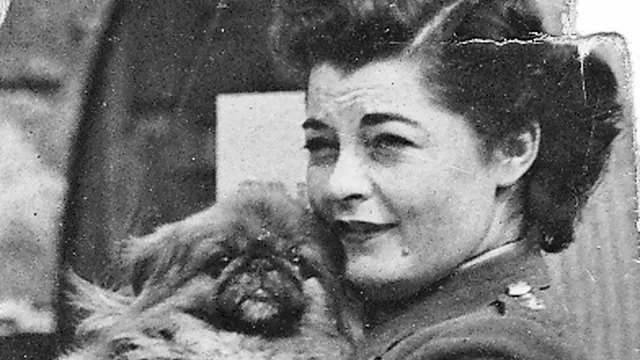
British agent reveals haunting experiences from Bergen-Belsen liberation
2025-04-14 19:00- British troops liberated the Bergen-Belsen concentration camp on April 15, 1945, revealing horrific conditions.
- The liberation was witnessed by Anne Powys-Lybbe, a British secret agent, and war correspondent Richard Dimbleby.
- Their accounts remind us of the bravery shown during this dark chapter in history and the importance of remembering these stories.
Express your sentiment!
Insights
On April 15, 1945, British troops entered the Bergen-Belsen concentration camp in Germany, uncovering one of the most tragic sights from World War II. Inside the camp, they were met with unbearable conditions, as survivors and deceased bodies were scattered throughout the facility. Among those who witnessed this harrowing event was Anne Powys-Lybbe, a 24-year-old British secret agent in the Special Operations Executive. Anne played a crucial role in escorting Richard Dimbleby, a notable war correspondent from the BBC, who reported on the grim scenes he encountered, referring to the survivors as a "great procession of ghosts." Anne Powys-Lybbe later chronicled her experiences in a written account for her family, ensuring that the horror of this moment would not be forgotten. As the 80th anniversary of the liberation approaches, stories from those involved continue to surface. Colonel Dick Taylor, who led the first British officers into the camp, offered a riveting account of the liberation to his nephew Edward. Taylor's firsthand experiences revealed the intense emotions and responsibilities faced by those who chose to liberate the camp. He not only focused on the immediate relief efforts to save the living and bury the dead but also highlighted the chilling reality of encountering the camp's notorious figures, including Irma Grese. These accounts reveal not only the brutality of the Holocaust but also the bravery displayed by those who dared to confront unimaginable horror. Both Anne and Colonel Taylor's narratives serve as crucial reminders of the grim realities of war. Their accounts bring to light the personal impact of the liberation on those who fought against Nazis, providing poignant reflections that resonate through generations. This documentation underscores the importance of remembering and sharing these stories, as it ensures that the tales of bravery and compassion will not become mere footnotes in historical records. Efforts to commemorate the lives lost and the struggles faced by survivors remain vital in honoring their memories, especially as society reflects upon the lessons learned from World War II. As we approach the anniversary, it is vital to recognize the contributions of individuals like Anne Powys-Lybbe and Colonel Dick Taylor. Their experiences highlight the profound stakes involved in the liberation of concentration camps and the ongoing need to confront hatred and oppression wherever it arises. This observance does not only acknowledge past atrocities but also calls for vigilance in protecting human rights and dignity for all people moving forward.
Contexts
The Bergen-Belsen concentration camp was liberated on April 15, 1945, by British forces, marking a significant juncture in the aftermath of World War II and the Holocaust. Established in 1940 in what is now northwestern Germany, Bergen-Belsen originally served as a prisoner-of-war camp, but over time it became a detention center for Jews, political prisoners, and various other groups persecuted by the Nazi regime. Conditions within the camp deteriorated severely as the war progressed, leading to widespread malnutrition, disease, and death among inmates. The advancing Allied troops encountered a horrific scene upon liberation, as they discovered thousands of emaciated bodies, and the remaining prisoners were in desperate need of immediate medical attention and humanitarian aid. The camp’s horrifying conditions and the vast number of casualties shocked the liberators and the world at large, emphasizing the devastating effects of Nazi policies and practices during the Holocaust. The British Army, facing unimaginable scenes of suffering, swiftly initiated recovery efforts, providing food, medical treatment, and shelter for the surviving prisoners, many of whom had been left in critical condition. Witnesses account of the emotional and traumatic atmosphere that gripped the camp at the time of liberation, as survivors grappled with the trauma of their experiences, including the loss of family members and the horrors they had endured. The liberation of Bergen-Belsen is a testament to both the darkness of human cruelty and the resilience of the human spirit, exemplified by the survivors' will to live and the efforts of humanitarian workers who began to restore hope fostered a commitment to remember those who perished and ensure that such atrocities never occur again. In the years following the liberation, Bergen-Belsen became emblematic of the Holocaust and is remembered for the reflections it prompted regarding the early warning signs of genocide, the failure of the world to intervene, and the moral obligations that emerge in the face of widespread human rights abuses. The site is now a memorial and museum, dedicated to the memory of the victims and the education of future generations about the Holocaust. Visitors to the site are encouraged to reflect on the lessons learned and to foster a culture of tolerance, acceptance, and understanding to prevent history from repeating itself. The liberation of Bergen-Belsen remains a poignant reminder of the horrors individuals can inflict upon one another, reinforcing the need for ongoing educational efforts about the Holocaust and the importance of standing against hatred in all its forms. It serves as an invitation for all individuals and nations to uphold their moral responsibility to protect human rights and ensure that dignified life is afforded to every person. In remembrance of those who suffered and perished, the liberation of Bergen-Belsen stands not only as a historical event but also as an ongoing call to action for humanity.